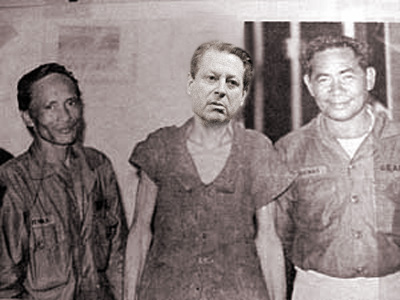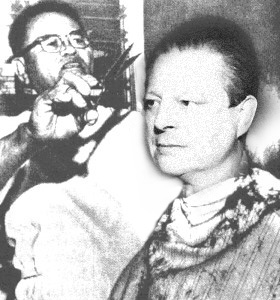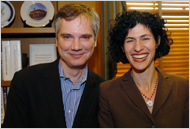New York Times reporter Andrew Revkin is moving to repair his relationship with alarmists after being stung by their expressed distrust.
In one of the notorious Climategate e-mails, hokey stick fabricator Michael Mann notes that Revkin is “not as predictable as we’d like.” Revkin moved to repair that breach of trust in his article today, co-authored with John Broder.
The article is below, annotated with our comments in bold.
December 7, 2009
In Face of Skeptics, Experts Affirm Climate Peril
By ANDREW C. REVKIN and JOHN M. BRODER
[We can’t even get past the title. In Sunday’s whitewash of Revkin’s Climategate reporting, Revkin told the Times‘ public editor, “Our coverage, looked at in toto, has never bought the catastrophe conclusion and always aimed to examine the potential for both overstatement and understatement.” Yet the title of today’s article “affirms” that the climate is in “peril.”]
Just two years ago, a United Nations panel that synthesizes the work of hundreds of climatologists around the world called the evidence for global warming “unequivocal.”
[And thousands of e-mails from two weeks ago show that the same UN panel has been cooking the books, destroying data and conspiring to silence opponents.]
But as representatives of about 200 nations converge in Copenhagen on Monday to begin talks on a new international climate accord, they do so against a background of renewed attacks on the basic science of climate change.
[The attack has been constant and has only intensified.]
The debate, set off by the circulation of several thousand files and e-mail messages stolen from one of the world’s foremost climate research institutes, has led some who oppose limits on greenhouse gas emissions, and at least one influential country, Saudi Arabia, to question the scientific basis for the <a title=”More articles about the United Nations Framework Convention on Climate Change.
[There is no evidence that the e-mails were stolen or hacked. Put together in response to a FOIA request, they were stored on a public server. No crime here.]
The uproar has threatened to complicate a multiyear diplomatic effort already ensnared in difficult political, technical and financial disputes that have caused leaders to abandon hopes of hammering out a binding international climate treaty this year.
In recent days, an array of scientists and policy makers have said that the correspondence and documents include references by prominent climate scientists to deleting potentially embarrassing e-mail messages, keeping papers by competing scientists from publication and making adjustments in research data undercuts decades of peer-reviewed science.
Yet the intensity of the response highlights that skepticism about global warming persists, even as many scientists thought the battle over the reality of human-driven climate change was finally behind them.
[There is no skepticism about “global warming.” There is skepticism that manmade emissions of greenhouse gases are having a discernible and negative effect.]
On dozens of Web sites and blogs, skeptics and foes of greenhouse gas restrictions at the scientific arguments for human-driven climate change. The stolen material was quickly seized upon for the questions it raised about the accessibility of raw data to outsiders and whether some data had been manipulated.
[Repeating that the e-mails were “stolen” does not make it so.]
An investigation into the stolen files is being conducted by the University of East Anglia, in England, where the computer breach occurred. Rajendra K. Pachauri, chairman of the United Nations Intergovernmental Panel on Climate Change, has also said he will look into the matter. At the same time, polls in the United States and Britain suggest that the number of people who doubt that global warming is dangerous or caused by humans has grown in recent years.
[Everyone who believes that the IPCC will conduct a bona fide investigation of itself, please stand on your head.]
Politics, ideology and economic interests interlace the debate, and the stakes on both sides are high. If scientific predictions about global warming’s effects are correct, inaction will lead at best to rising social, economic and environmental disruption, at worst to a calamity far more severe. If the forecasts are wrong, nations could divert hundreds of billions of dollars to curb greenhouse gas emissions at a time when they are struggling to recover from a global recession.
Yet the case for human-driven warming, many scientists say, is far clearer now than a decade ago, when the skeptics included many people who now are convinced that climate change is a real and serious threat.
[A decade of global cooling validates global warming?]
Even some who remain skeptical about the extent or pace of global warming say that the premise underlying the Copenhagen talks is solid: that warming is to some extent driven by greenhouse gases spewing into the atmosphere from human activities like the burning of fossil fuels and deforestation.
Roger A. Pielke Sr., for example, a climate scientist at the University of Colorado who has been highly critical of the United Nations climate panel and who once branded many of the scientists now embroiled in the e-mail controversy part of a climate “oligarchy,” said that so many independent measures existed to show unusual warming taking place that there was no real dispute about it. Moreover, he said, “The role of added carbon dioxide as a major contributor in climate change has been firmly established.”
[Pielke actually says that the totality of human activities are important, not CO2 by itself.]
The Copenhagen conference itself reflects increasing acceptance of the scientific arguments: the negotiations leading to the talks were conducted by high-ranking officials of the world’s governments rather than the scientists and environment ministers who largely shaped the 1997 Kyoto Protocol. Late last week,President Obama changed the date of his visit to Copenhagen to Dec. 18, the last day of the talks.
For many, a 2007 report by the Intergovernmental Panel on Climate Change was a marker of a shift in the global warming debate. In it, the panel — a volunteer network of hundreds of scientists from many disciplines who meet periodically to review climate studies and translate the results into language useful to policy makers — concluded that no doubt remained that human-caused warming was under way and that, if unabated, it would pose rising risks.
[IPCC = Climategate]
Over the last several decades, other reviews, by the National Academy of Sciences and other institutions, have largely echoed the panel’s findings and said the remaining uncertainties should not be an excuse for inaction.
[Same “scientists,” different acronym.]
The panel’s report was built on two decades of intensive scientific study of climate patterns.
[“Study”? Or manipulation, fabrication, distortion, etc.?]
Greenhouse gases warm the planet by letting in sunlight and blocking the escape of some of the resulting heat. “The physics of the greenhouse effect is so basic that instead of asking whether it would happen, it makes more sense to ask what on earth could make it not happen,” said Spencer Weart, a physicist and historian. “So far, nobody has been able to come up with anything plausible in that line.”
[Is Revkin really trying to imply that skeptics are skeptical of the greenhouse effect?]
The atmospheric concentration of greenhouse gases released by humans has risen rapidly in the last century, along with industrialization and electricity use. Carbon dioxide from burning of coal, oil and natural gas is the most potent of the greenhouse gases because it can persist in the atmosphere for a century or more.
Methane — from landfills, livestock and leaking pipes, tanks and wells — has recently been found to be a close second. And these gases not only have a heating effect, but also cause evaporation of water from sea and soil, producing water vapor, another powerful heat-trapping gas.
[The challenge for alarmists, however, is to show that human emissions drive or discernibly affect the climate, and that such change is necessarily for the worse. That has not been done.]
In reaching its conclusion, the climate panel relied only partly on temperature data like that collected by the scientists at the Climatic Research Unit at the University of East Anglia, whose circulated e-mail correspondence set off the current uproar. It also considered a wide range of data from other sources, including measurements showing the retreat of glaciers in mountain ranges around the world, changes in the length and character of the seasons, heating of the oceans and marked retreats of sea ice in the Arctic.
[LOL. The CRU data is extensively used and relied on by alarmists. The other climatic phenomena may or may not be occurring, but unless tied to human greenhouse gas emissions, the hypothesis of manmade climate change is a loser.]
Since 1979, satellites have provided another check on surface temperature measurements. Strong disagreements about how to interpret the satellite data were largely resolved after the Bush administration began a review in which competing research groups worked out some of their differences.
[Satellite data, which only shows very slight warming, does not validate that it was caused by man.]
Science is about probability, not certainty. And the persisting uncertainties in climate science leave room for argument. What is a realistic estimate of how much temperatures will rise? How severe will the effects be? Are there tipping points beyond which the changes are uncontrollable?
[Science is not about probability. It is a systematic process through which we learn about the natural world. Science is, in fact, about reaching certainty. No one went to the moon on a wing and a prayer.]
Even climate scientists disagree on many of these questions. But skeptics have been critical of the data assembled to show that warming is occurring and the analytic methods that climate scientists use, including mathematical models used to demonstrate a human cause for warming and project future trends.
[Skeptics are not critical of the fact of warming — only about to the degree, causes and effects.]
Both sides also have at times been criticized for overstatement in characterizing the scientific evidence. The contents of the stolen e-mail messages and documents have given fresh ammunition to the skeptics’ camp.
[Climategate equals vindication, not ammunition. Imagine if we could peek at all the alarmists’ e-mails.]
The Climatic Research Unit’s role as a central aggregator of temperature and other climate data has also made it a target.
[“Central aggregator” of data? Didn’t Revkin just say that the CRU wasn’t all that important?]
One widely discussed file extracted from the unit’s computers, presumed to be the log of a researcher named Ian Harris, recorded his years of frustration in trying to make sense of disparate data and described procedures — or “fudge factors,” as he called them — used by scientists to eliminate known sources of error.
The research in question concerned attempts to chart past temperature changes by studying tree rings and other indirect indicators, an area of research that has long been fraught with disputes. An influential study that drew in part on the British data was challenged in 2003. In 2006, a review by the National Academy of Sciences concluded, with some reservations, that “an array of evidence” supported the broad thrust of the research.
[As before, NAS = IPCC scientists under a different acronym.]
To skeptics, the purloined files suggest a conspiracy to foist an expensive policy agenda on the nations of the world and to keep inconsistent data from the public.
“If we were arguing about archaeology then people could hoard their data,” said Stephen McIntyre, a bloggerand retired Canadian mining consultant who since 2003 has investigated climate data, sometimes finding errors. “But I don’t think the public has any time for that” in the climate debate.
Many scientists, however, deny that any important data was held back and say that the e-mail messages and documents will in the end prove merely another manufactured controversy.
[Will the real “deniers” please stand up?]
“There will remain after the dust settles in this controversy a very strong scientific consensus on key characteristics of the problem,” John Holdren, President Obama’s science adviser, told a Congressional hearing last week. “Global climate is changing in highly unusual ways compared to long experienced and expected natural variations.”
[The concept of “consensus” has no role in science. In any event, how does the actual consensus of 32,000 skeptics compare to the alleged consensus of IPCC-Climategaters?]
Whichever view prevails, the questions will undoubtedly linger well after the negotiators who are trying to work out the complex issues that still stand in the way of an international climate treaty leave Copenhagen.
[I thought the “experts affirmed” that the climate was in “peril”? What questions can there still be, Andy?]
Andrew C. Revkin reported from New York, and John M. Broder from Washington.
[One of the few accuracies in this article.]
So Andrew the Apologist has atoned to the alarmists. Maybe Michael Mann will now welcome him back into the alarmist fold and give him back his 100%-alarmist rating.
BTW, global warming is Mann-made.





